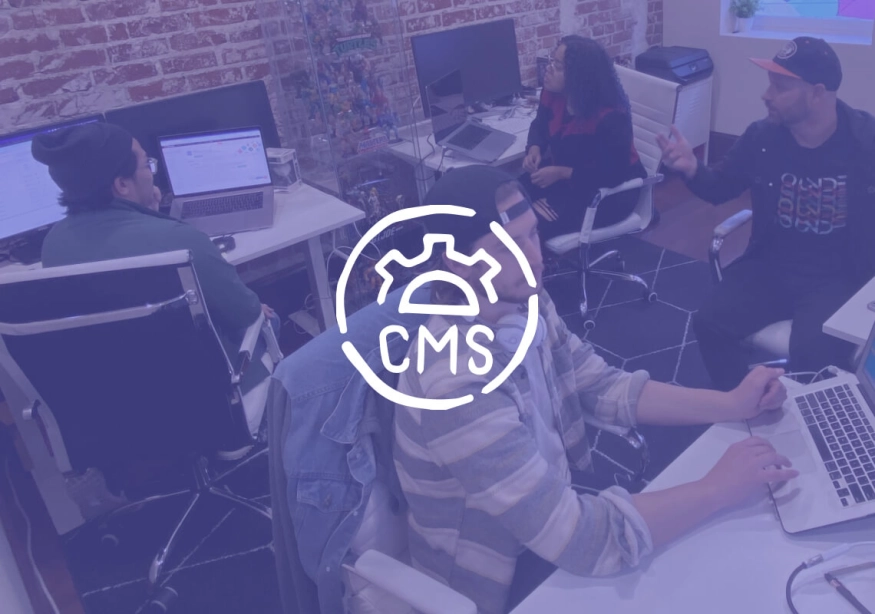Drupal is a powerful content management system (CMS) that stands as a top choice for enterprises seeking robust digital solutions. This guide is tailored for businesses considering a full Drupal implementation, site migration, site audit, Drupal development services, or marketing services.
What is Drupal?
Drupal is an open-source CMS known for its flexibility and scalability. It's a platform that empowers millions of websites and applications, designed to meet the diverse needs of different organizations, from small businesses to large enterprises and government agencies. With a strong focus on customization and extensibility, Drupal enables users to create and manage a wide range of content types.
Pros and Cons of Drupal
Understanding the strengths and limitations of Drupal is crucial for organizations when deciding if it's the right CMS for their needs. Let’s delve deeper into the pros and cons of using Drupal.
Pros of using Drupal
High customizability and flexibility
Varied Functionalities: Drupal’s extensive array of modules and themes allows for creating highly customized and diverse functionalities tailored to specific business needs.
Adaptability: Whether it’s a corporate website, an e-commerce platform, or a social networking site, Drupal adapts to various project requirements with ease.
Strong security features
Enterprise-Level Security: Drupal is known for its robust security, making it a preferred choice for government and enterprise websites where data security is paramount.
Regular Updates: The Drupal community is proactive in identifying and fixing security vulnerabilities, providing regular updates to keep the system secure.
Active community support
Collaborative Environment: Drupal’s vast community of developers and users fosters a collaborative environment, offering support, sharing knowledge, and contributing to the platform’s development.
Resources and Documentation: The community provides extensive resources, including detailed documentation, forums, and online tutorials, assisting users at all expertise levels.
Advanced user management
Granular access control: Drupal allows for detailed user role and permission settings, enabling effective management of user access to different parts of the website.
Scalable user base: It can efficiently handle websites with a large number of users, which is ideal for membership sites, community platforms, and internal company portals.
Cons of using Drupal
Steeper learning curve compared to other CMSs
Complexity for Beginners: Drupal’s advanced capabilities come with a complexity that can be daunting for beginners or for those accustomed to more straightforward CMS platforms.
Requires Time Investment: New users may require significant time to learn how to use Drupal effectively, especially for customizing and utilizing advanced features.
Higher cost of development due to complexity
Expertise Required: The level of customization and complexity often means that skilled developers are needed, which can increase development costs.
Longer Development Time: Building a highly customized site with Drupal can take longer than simpler CMSs, potentially increasing the overall project cost.
Requires technical expertise for advanced features
Developer-dependent: To fully leverage Drupal’s advanced features, technical expertise is often required, making it less accessible for users without a technical background.
Maintenance and updates: Regular maintenance and updates may require technical knowledge, which could be a hurdle for some organizations without dedicated IT support.
Drupal architecture
Drupal's architecture is a cornerstone of its power and flexibility, enabling users to build highly customized and scalable solutions. This architecture is primarily modular, comprising several key components that work together seamlessly. Here’s a more detailed look at each of these components
Core: The foundational layer
At the heart of Drupal lies its Core, the primary framework of the CMS. This foundational layer is equipped with essential content management features like user registration, content creation, and basic site security. The strength of Drupal Core lies in its robust API support, which includes Render API, Database API, among others. These APIs are crucial for developers who aim to create custom behaviors and features, tailoring the CMS to specific needs.
Additionally, the Core comes with built-in modules that cover fundamental functionalities such as content types, menu management, and taxonomy for content organization. This ensures that Drupal is ready to be used effectively for basic website requirements immediately after installation.
Modules: Extending functionality
Moving beyond the Core, Drupal's architecture is greatly enhanced by its modules, which are central to its extensibility. The Drupal community offers a vast repository of modules, each designed to add specific functionalities to a site. These range from SEO optimization to social media integration, catering to an array of needs.
For enterprises with unique requirements, custom module development is a game-changer, allowing the creation of features that standard modules might not offer. Moreover, these modules not only enhance the site's internal features but also pave the way for seamless integration with external services and applications like CRM systems and e-commerce platforms, further expanding Drupal's capabilities.
Themes: Look and feel
The visual aspect of a Drupal site is governed by its themes. These themes are responsible for defining the look and feel of the website, controlling how content is presented to the end-user. Most Drupal themes are designed to be responsive, automatically adapting to different screen sizes, an essential feature for modern web design.
Drupal's approach to theming includes the concept of 'sub-theming', where designers can craft a child theme derived from a parent theme. This approach fosters design consistency while allowing customization and flexibility.
Distributions: Pre-configured packages
Lastly, Drupal offers distributions – pre-configured packages tailored for specific use cases. These distributions are purpose-built solutions, encompassing a set of modules, themes, and configurations designed to meet the needs of particular industries or functional requirements.
Examples of such distributions include 'Commerce Kickstart' for e-commerce sites, 'OpenSocial' for social communities, and 'Panopoly' for enhanced editorial features. Distributions offer a significant advantage in terms of time and cost efficiency, providing a comprehensive foundation that businesses can then customize to their specific needs.
Drupal's modular architecture is a testament to its adaptability and power in the CMS world. It allows for extensive customization and scalability, ensuring that each Drupal site can be as unique as the enterprise it represents. By understanding and leveraging the core, modules, themes, and distributions, businesses can create a digital presence that is not only visually appealing and functional but also robust and future-proof.
Who should use Drupal?
Drupal, with its remarkable flexibility, security, and scalability, is an excellent choice for a wide range of organizations. Here's a closer look at the types of entities that can benefit most from what Drupal has to offer:
Large corporations and enterprises
Why?
1. Complex needs, simple solutions
Large businesses often have complex needs and require a robust CMS that can handle diverse content types, high traffic, and intricate user roles. Drupal’s scalability and flexibility make it ideal for handling these complex requirements efficiently.
2. Customization for brand identity
Corporations can leverage Drupal to create a unique digital presence that aligns with their brand identity. Drupal's customizable themes and modules enable them to tailor their site’s design and functionality to reflect their brand accurately.
3. Integration capabilities
Enterprises frequently use a variety of software systems. Drupal’s ability to integrate seamlessly with different business tools, such as ERP and CRM systems, makes it a valuable asset for corporate environments.
Government agencies
Why?
1. Security and compliance
Government websites require high levels of security and compliance with various regulations. Drupal’s strong security framework makes it a trustworthy choice for handling sensitive information.
2. Accessibility and multilingual features
Government agencies often need to cater to a diverse audience. Drupal’s native support for accessibility standards and multilingual capabilities ensures that government websites are accessible and understandable to all citizens.
Higher education institutions
Why?
1. Diverse user base management
Universities and colleges cater to a broad audience, from prospective students to alumni. Drupal’s robust user management system can handle this diversity efficiently.
2. Educational resource integration
Additionally, Drupal can integrate with various educational tools and resources, making it an excellent platform for creating educational portals, libraries, and research databases.
Non-Profits and NGOs
Why?
1. Cost-effective solutions
Budget constraints are a significant consideration for non-profits. Drupal, being open-source, offers a cost-effective solution without compromising on quality or functionality.
2. Community and volunteer engagement
Non-profits require effective communication channels for community engagement. Drupal’s social networking and forum modules can facilitate this engagement, allowing for active volunteer and donor participation.
Media and publishing companies
Why?
1. Content management and distribution:
Media companies need to manage and distribute large volumes of content daily. Drupal’s strong content management capabilities and its ability to handle high traffic make it a go-to choice for media and publishing sites.
2. Customizable content workflow
The ability to customize content workflows in Drupal helps media companies maintain their editorial processes efficiently, from content creation to publication.
Drupal community and other resources
The Drupal community is not just a group of users and developers; it’s a dynamic and collaborative ecosystem that plays a crucial role in the ongoing development and support of Drupal. Here's an expanded look at the various facets of the Drupal community and the resources it offers:
Forums and discussions
The Drupal forums are a hub for users to seek advice, share solutions, and discuss all things Drupal. Whether you're a beginner or an expert, the forums are an invaluable resource for peer support. Additionally, special interest groups cater to specific aspects of Drupal, like accessibility, design, development, and more. They are great for deepening knowledge in particular areas of interest.
Documentation: Comprehensive guides and tutorials
Drupal.org hosts a vast library of documentation, covering everything from basic installation and site building to advanced development and theming.
For new users, there are comprehensive guides that provide step-by-step instructions on using Drupal effectively. On the development side of things, developers benefit from detailed API documentation, which is essential for creating modules and themes.
Events and meetups: Opportunities for networking and learning
DrupalCon: This is the premier Drupal event, held annually and attracting thousands of Drupal enthusiasts. It’s a week-long conference featuring sessions, workshops, and keynotes from top Drupal professionals.
Local Meetups: Around the world, local Drupal user groups host regular meetups. These smaller, community-driven events are excellent for networking and sharing knowledge within local Drupal communities.
Camps and Sprints: Drupal camps are regional events that focus on learning and contributions. Code sprints, which often happen at these camps, bring developers together to work on Drupal projects.
Acquia - Drupal community
Acquia, co-founded by Drupal's creator Dries Buytaert, plays a pivotal role in enhancing Drupal's documentation and learning resources. Their contributions and support tools are invaluable for users at all levels.
Acquia engagements
At major Drupal events like DrupalCon, Acquia often has a significant presence, offering workshops, sessions, and keynote speeches. These events are opportunities to learn from Acquia’s vast experience and expertise in the Drupal landscape.
Acquia’s contribution to code and standards
Acquia not only contributes code and modules but also works towards improving standards and practices within the Drupal community, encouraging others to contribute and uphold these standards.
Additional Acquia resources
Acquia cloud and developer tools: Acquia provides a suite of tools and services like Acquia Cloud, which enhances the Drupal experience by offering a secure, scalable platform for building and managing Drupal sites.
Learning and certification: Acquia’s learning and certification programs are instrumental for Drupal professionals looking to validate and enhance their skills in Drupal development and theming.
Community is central to Drupal’s foundation
The Drupal community, bolstered by the involvement of key players like Acquia, is the foundation of Drupal’s evolution and success. It’s a community where the synergy of individual contributors, developers, users, and companies like Acquia create a thriving ecosystem. This collective effort not only drives innovation but also ensures robust support and resources are available to everyone in the community, from beginners to seasoned experts.



